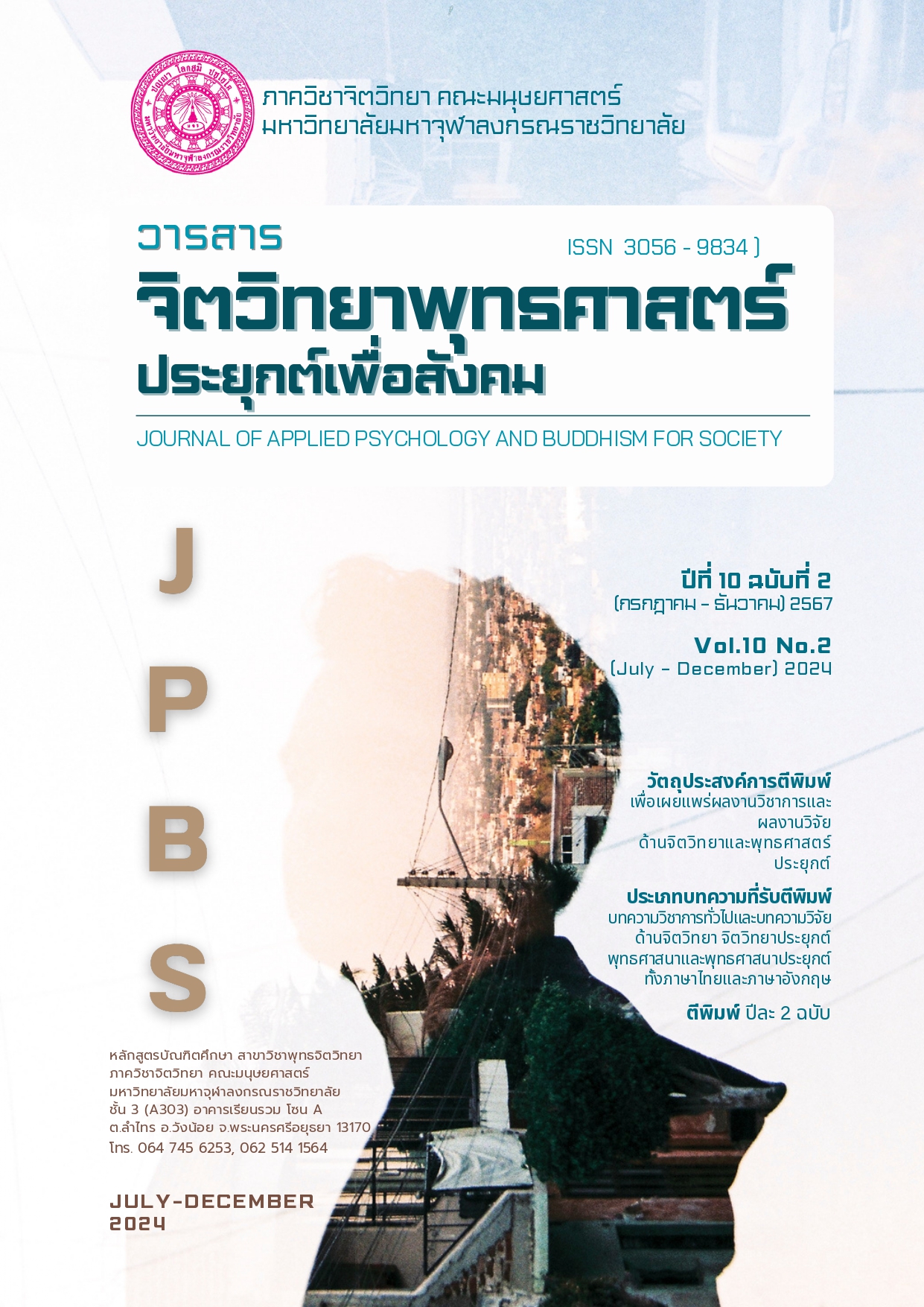การพัฒนาความฉลาดทางอารมณ์ในโลกยุค AI
คำสำคัญ:
ความฉลาดทางอารมณ์, ปัญญาประดิษฐ์, สมาธิ, สติบทคัดย่อ
ความฉลาดทางอารมณ์มีความสำคัญอย่างมากในโลกยุคปัจจุบันที่ถูกเรียกว่าโลกยุค AI (เทคโนโลยีปัญญาประดิษฐ์) เนื่องจากความฉลาดทางอารมณ์เป็นความสามารถในการควบคุมอารมณ์และความต้องการของตน การรู้จักเห็นใจผู้อื่น รวมถึง ความรับผิดชอบต่อส่วนรวม จึงทำให้สามารถเผชิญกับสถานการณ์ที่กดดันจากการเปลี่ยนแปลงครั้งสำคัญของโลกปัจจุบัน ทั้งทางด้านระบบสื่อสาร สังคม เศรษฐกิจและการเมือง และการเกิดขึ้นของ AI นั้นมีบทบาทอย่างมากในทุกมิติของชีวิต ไม่เพียงแต่เพิ่มประสิทธิภาพในการทำงาน การสื่อสารและการตัดสินใจต่าง ๆ แต่ยังได้เปลี่ยนแปลงวิธีการปฏิสัมพันธ์ของบุคคลและระหว่างบุคคล รวมถึงรูปแบบการทำงานภายในองค์กร แต่ทุกสิ่งในโลกนี้มีทั้งคุณและโทษไม่เว้นแม้นแต่ AI จากการแข่งขันที่รุนแรงและการเปลี่ยนแปลงอย่างรวดเร็วทำให้คนในยุคสมัยนี้เกิดสภาวะทางอารมณ์ที่แปรปรวน สุขยาก ทุกข์ง่าย รวมทั้ง ทำให้ปัญหาสุขภาพจิตในสังคมไทยมีความซับซ้อนมากขึ้น และยังครอบคลุมในทุกช่วงวัย
การพัฒนาความฉลาดทางอารมณ์ เป็นการพัฒนาความสามารถในการรับรู้ เข้าใจ จัดการ บริหารและใช้อารมณ์ของตนเองได้ดีขึ้น รวมถึง สามารถเลือกใช้อารมณ์เมื่อปฏิสัมพันธ์กับผู้อื่นได้ดีขึ้นใน 5 ด้านได้แก่ 1) ตระหนักรู้อารมณ์ของตน 2) ควบคุมตน 3) สร้างแรงจูงใจ 4) เห็นอกเห็นใจ และ 5) เพิ่มทักษะทางสังคม
การประยุกต์ใช้การฝึกสมาธิและฝึกสติ ในการพัฒนาความฉลาดทางอารมณ์เป็นวิธีที่หนึ่งที่ง่าย และทำได้ทุกที่ทุกเวลาโดยไม่มีค่าใช้จ่าย การฝึกสมาธิและฝึกสติเป็นการพัฒนาในด้านจิตใจซึ่งเป็นฐานของพฤติกรรม เมื่อพฤติกรรมทุกอย่างเกิดขึ้นจากความตั้งใจ และแรงจูงใจที่ถูกที่ควร ปัญญาก็จะถูกพัฒนา ซึ่งสติและปัญญาที่ถูกพัฒนานี้เองจะเป็นส่วนในการพัฒนาความฉลาดทางอารมณ์ ซึ่งเป็นการเสริมสร้างการรับรู้ตนเอง ควบคุมและจัดการอารมณ์ รวมถึงมีวิจารณญาณในการตัดสินใจ ทำให้ดำรงชีวิตในยุคที่เปลี่ยนแปลงอย่างรวดเร็ว คลุมเครือและผันผวน ที่เรียกว่า ยุค “AI” ได้อย่างมีสุข
เอกสารอ้างอิง
กรมสุขภาพจิต (2543). อีคิว : ความฉลาดทางอารมณ์ (พิมพ์ครั้งที่ 2). นนทบุรี : สำนักพัฒนาสุขภาพจิต กรมสุขภาพจิต.
มหาจุฬาลงกรณราชวิทยาลัย. (2539). พระไตรปิฎก เล่มที่ 34 พระสุตตันตปิฎกเล่มที่ 1. กรุงเทพฯ : โรงพิมพ์มหาจุฬาลงกรณราชวิทยาลัย.
มหาจุฬาลงกรณราชวิทยาลัย. (2539). พระไตรปิฎก เล่มที่ 35 พระอภิธรรมปิฎกเล่มที่ 2. กรุงเทพฯ : โรงพิมพ์มหาจุฬาลงกรณราชวิทยาลัย.
พระพรหมคุณาภรณ์ (ป. อ. ปยุตฺโต). (2549). พระพุทธศาสนา พัฒนาคนและสังคม (พิมพ์ครั้งที่ 6). กรุงเทพฯ : โรงพิมพ์ บริษัท สหธรรมิก จำกัด.
สมเด็จพระพุทธโฆษาจารย์ (ป.อ. ปยุตฺโต). (2564). พุทธธรรม ฉบับปรับปรุง (พิมพ์ครั้งที่ 46). กรุงเทพฯ : สำนักพิมพ์ บริษัท สหธรรมิก จำกัด.
สมเด็จพระพุทธโฆษาจารย์ (ป.อ.ปยุตฺโต). (2564). พจนานุกรมพุทธศาสตร์ ฉบับประมวลธรรม (พิมพ์ครั้งที่ 35). กรุงเทพฯ : สำนักพิมพ์ บริษัท สหธรรมิก จำกัด.
Ashkanasy, N. M., & Daus, C. S. (2005). Rumors of the Death of Emotional Intelligence in Organizational Behavior Are Vastly Exaggerated. Journal of Organizational Behavior, 26(4), 441-452.
Brynjolfsson, E., & McAfee, A. (2017). Machine, Platform, Crowd: Harnessing Our Digital Future. Now York: W. W. Norton & Company.
Caruso, D. R., & Salovey, P. (2004). The Emotionally Intelligent Manager: How to Develop and Use the Four Key Emotional Skills of Leadership. San Francisco: Jossey-Bass.
Cherniss, C., & Goleman, D. (2001). The Emotionally Intelligent Workplace: How to Select for, Measure, and Improve Emotional Intelligence in Individuals, Groups, and Organizations. San Francisco: Jossey-Bass.
Floridi, L., Cowls, J., Beltrametti, M., Chatila, R., Chazerand, P., Dignum, V., & Luetge, C. (2018). AI4People—An Ethical Framework for a Good AI Society: Opportunities, Risks, Principles, and Recommendations. Minds and Machines, 28(4), 689–707.
Ford, M. (2015). Rise of the Robots: Technology and the Threat of a Jobless Future. New York: Basic Books.
Goleman, D. & Davidson, R.J. (2017). Altered Traits: Science Reveals How Meditation Changes Your Mind, Brain, and Body. (ebook edition). New York: Penguin Random House.
Goleman, D. (1995). Emotional intelligence: Why It Can Matter More Than IQ. New York: Bantam Books.
Goleman, D. (1999). Working with Emotional Intelligence. Dublin: Gloomsbury Publishing.
Kaspersen, L. B., & Ottesen, L. (2020). Emotional Intelligence and Mindfulness in the Digital Age. International Journal of Emotional Intelligence, 7(2), 89-105.
Mayer, J. D., Salovey, P., & Caruso, D. R. (2008). Emotional Intelligence: New Ability or Eclectic Traits?. American Psychologist, 63(6), 503-517.
McCord, M. A. (2023). The Impact of AI on Social Dynamics: A Statistical Review. Journal of AI Ethics, 14(3), 102-118.
Nate Bennett and G. James Lemoine. (2014). What VUCA Really Means for You, Harvard Business Review. (online), Retrieved September 20, 2024, from https://hbr.org/2014/01/what-vuca-really-means-for-you
Patel, V. (2020). AI and Ethics: Balancing Technological Advancement with Human Values. Ethical AI Journal, 12(1), 47-58.
Petrides, K. V., & Furnham, A. (2001). Trait Emotional Intelligence: Psychometric Investigation with Reference to Established Trait Taxonomies. European Journal of Personality, 15(6), 425-448.
Russell, S., & Norvig, P. (2003). Artificial Intelligence: A Modern Approach (2nd ed.). New Jersey: Pearson.
Seligman, M. E. P. (2011). Flourish: A Visionary New Understanding of Happiness and Well-being. New York: Free Press.
Sutton, A. (2016). Measuring Emotional Intelligence: Current Trends and Future Directions. Journal of Organizational and Educational Psychology, 2(3), 91-102.
Topol, E. (2019). Deep Medicine: How Artificial Intelligence Can Make Healthcare Human Again. New York: Basic Books.
World Economic Forum. (2023). The Future of Jobs Report 2023. Retrieved September 15, 2024, from https://www.weforum.org/reports/the-future-of-jobs-report-2023
ดาวน์โหลด
เผยแพร่แล้ว
รูปแบบการอ้างอิง
ฉบับ
ประเภทบทความ
หมวดหมู่
สัญญาอนุญาต
ลิขสิทธิ์ (c) 2024 วารสารจิตวิทยาพุทธศาสตร์ประยุกต์เพื่อสังคม

อนุญาตภายใต้เงื่อนไข Creative Commons Attribution-NonCommercial-NoDerivatives 4.0 International License.






